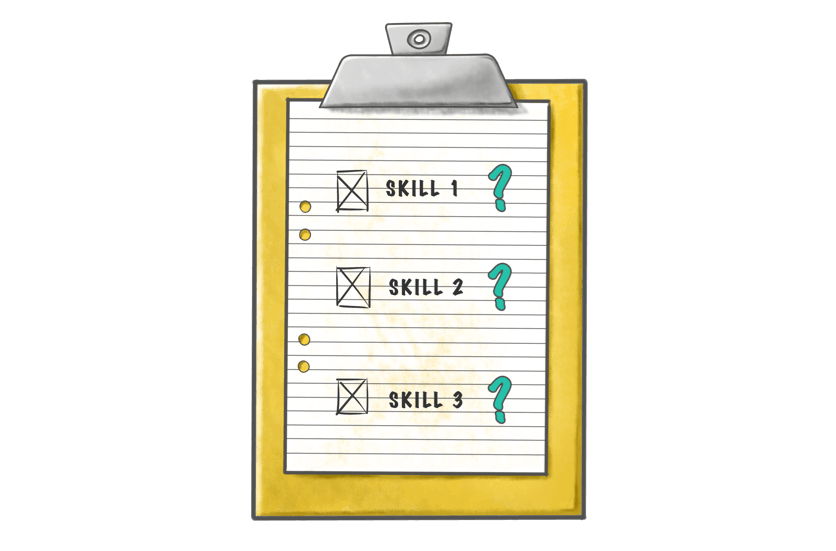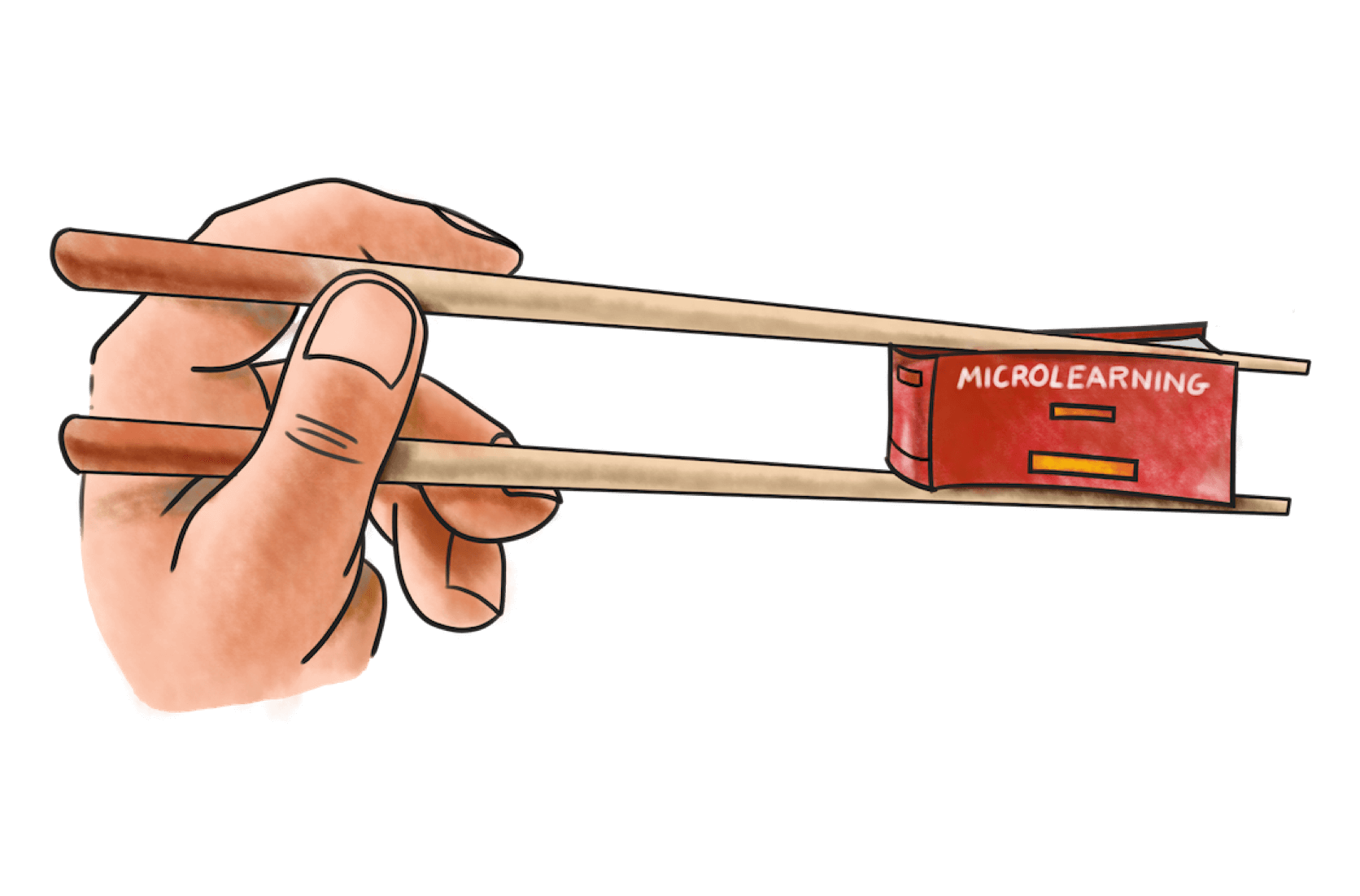
At Yarno, we know a lot about little bites of learning. Bite-sized pieces of content, snack-sized; a special treat for that hungry brain of yours. We're a learning company after all, it's important that we know our stuff when it comes to learning. How people learn, the best way to impart knowledge, and how to make what you learn, stick: these are our bread and butter. And, if you're a regular on the Yarno blog, they're your bread and butter, too, 'cos we write about them a lot (like here and here, for example. Plus, our in-depth Microlearning Whitepaper that is the culmination of everything we've learnt about microlearning, so far).
What I'm trying to say is, learning and Yarno are basically synonymous. And while we love our product (and it seems our customers do, too!) that's really only one half of what we do. Though we cringe when he says it, our co-founder Mark is pretty spot-on when he describes Yarno as a 'SAASulting' service. What he means by it is that two parts combine to make the Yarno whole: the Yarno product and Yarno as a consultancy. We're an end-to-end training solution, baby, there's no gap in our products and services. So here I am to tell you a little about the ecosystem of Yarno, from start to finish.
We start with a goal, or - dare I say - dream
Our vision at Yarno is to create fast and smart hyperlearning organisations. These are organisations that see continuous learning and a healthy culture as competitive advantages and foundational to their long term success. They invest in their people to continually develop understanding, mindset and skills.
Our co-founder and Managing Director, Lachy Gray, talks a bit about what a hyperlearning organisation is in the video below.
Which is to say, everything we do at Yarno is a means toward this goal. A common problematic approach to company training is to treat it as an end in and unto itself. But that's so silly! The point of going to class isn't to go to class. The point of going to class is to learn something that will help you in some way.
Which reminds me of something my year 9 maths teacher said. I was never a very motivated or talented maths student and one day I was having particular strife with algebra. I was bad at it, uninterested in it, and didn't want to do it. I hit my teacher with an argument to which I was sure there was no defence: "But Miss, I'm never going to need to use this in the real world'.
Boom. I got ya Miss Anthony.
But, possibly because it was the least original objection to completing algebra since the dawn of algebra (which I'm pretty sure happened something like 2500 years ago) Miss Anthony had a comeback locked and loaded. She put down her chalk, looked me in the eye, and said: 'Yes, but learning algebra trains the part of your brain responsible for problem solving. Which is a skill you will use every day of your adult life.'
Miss Anthony's third eye was obviously open that day because, man, was she right. No, I haven't used algebra since I finished high school (I went on to study Law and Communications...a decision at least 50% influenced by its large geographical, so to speak, distance from maths). But! I have to problem solve every day, and that is a skill that was fostered (against my will) in many a maths class in my younger and more obstinate years.
Okay! Now is the point where we use my story above as a metaphor for our approach to learning at Yarno. To save time (and as a lead-in to a point I'm about to make below about how learning should be engaging), I'm going to metaphor-icise via meme:

What I'm saying is, when you come to Yarno, we don't ask you what training you want to do. We ask you what your goals are, and we devise training which reaches those goals. We're not just here to tick boxes, we're here to change behaviours and produce outcomes.
Then we add a bit of ~flavour~
The Yarno product is built on a few key learning principles. They are:
But, overarching all of these principles is one guiding star: that all content we produce should be engaging.
Why? Well, really the reason is pretty obvious: because you're more likely to learn from content you're engaged with. There's a few different ways we do this...First, by hiring top notch content writers like Joel Smith, Erin McGee, Sanki Tennakoon and Jack Turner. We get approximately 50% of the way there just by hiring great writers (it's a bit of a cheat code, one we'd highly recommend). But talent only goes so far, then comes training.
Or, in our case, then comes memes. And casual language. And doing away with formalities and this-is-how-it-should-be-done in favour of whatever formulation of words, whatever combination of syllables, gets the point across. Writing is fluid, it's water, it's mix-and-match and can't be reduced to formulae. So we don't set our content writers a matrix for writing content. But what we do say is this: say what you mean to say, as clearly and as plainly as possible. Writing that 'sounds' smart probably isn't.
The other thing we say to them is, have a little fun with it. Add jokes! Memes! More exclamation points than is generally considered appropriate in instructional writing! Our theory is, the more you LOL, the more you'll learn. And we've got empirical study to back us up. Speaking of which, we give an overview of that research over here if you feel like being the smarty-pants at your next meeting, Zoom-beers, or networking event.
Finally, add some culture
Right now, you might be feeling a little unconvinced of my argument. You're thinking: 'Courtney, you've premised that training is just a means to the greater ends of sustainable business success, but training content, no matter how great, isn't going to have that much influence on the wider business structure.'
To which I say: you're right. Your 3-minutes a day Yarno quiz isn't going to substantially alter the structure of your business, revolutionise it over night.
But you know what does revolutionise businesses? Conversations.
Yarno is called Yarno because it's about, well, having a yarn. That's why every customer contract begins with a content workshop. That's why Yarno is a competition. That's why every Yarno customer has an assigned customer success manager who they can chat to anytime, about anything. That's why we're a high touch, high results platform.
In fact, Yarno started from conversations. First, between our co-founders Mark and Lachy on a ski-lift in Japan about the digital skills that agency clients are often missing. Then, when they discovered that this problem hadn't been validated in the market, with companies about what they feel they're missing in their corporate training regimen. It's not just your therapist who says it, but Yarno, too: communication is key.
One of our customers recently shared with us that a key value they find in Yarno is its ability to contextualise learning material and put learners in a 1:1 coaching scenario, at scale. Whoop! That is quite literally, what it's all about.
Another one of our customers also recently told us that we're their only service provider that puts together review reports and who holds feedback meetings. Yahoo! Why do we do it? Because (1) it provides an opportunity for us to receive feedback on our product from which we can review and optimise our products and services and (2) it's part of the service itself. Feedback, review meetings, are opportunities not only for us, but for our customers. To set aside time to think about what's working, what's not, and how we can get from here to there.
We're communicators, all of us
We write a lot at Yarno. Like...a lot a lot. We blog, Slack, post on LinkedIn, have our own internal Learning Library...the list goes on.
Why do we do it?
- We write because we're communicators at heart.
- We write because we're progressionists, and believe reflection is vital to growth.
- We write because we're always learning, and our values compel us to share the insights we assemble.
- We write because we're inspired by what we do, and have a lot to say.
- We write because we endeavour to be pioneers in our field, and our writing is the flag we plant to tell the world, "We are Yarno, and we're here to play!"
All of the above is to say that we don't keep our knowledge to ourselves. That's why I'm writing this blog post, to provide a guide, to shed a little more light, on the principles that make up the bones of our very special not-so-little-anymore company. Part of our communicative-predilection is that a few of us have knowledge areas that we discuss pretty regularly on both the Yarno blog and LinkedIn. I definitely recommend checking them out when the learning-mood next strikes you:
Lachy Gray, co-founder and our MD, who regularly writes about leadership, company culture, decision-making, and his budding romance with the City of Newcastle.
Mark Eggers, co-founder and Head of Sales, who has the gift of the gab and gabs a lot about customer service, the power of humour and/or memes, and why the UK Office is better than the US.
Mo Abdelrahman, our Melbourne-based Sales Manager, who talks all things safety in the transport industry, transport industry news, and clean tech.
If email newsletters are your jam, you can also subscribe to the Yarn. It's our monthly newsletter where we talk all things brain science, learning industry news, and what's happening with the Yarno team.
Wrap up
Something we talk a lot about at our quarterly team strategy sessions is how we can widen our "moat". A "moat" is Warren Buffet's term for competitive advantage; it's what separates us from our competitors. And what we've discovered over the past (nearly) five years of Yarno-ing, is that our competitive advantage is us, the people who work at Yarno. The Yarno product is great - it's built on a bedrock of learning science, clever engineering, and sleek UX. But what separates us is that we're not a low-cost high-volume tool because our customers don't get the results they need with that model (you get what you pay for, after all). We're here to listen, make plans, and design content with you every step of the way, until you get the results you need.















































































































